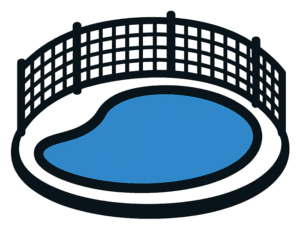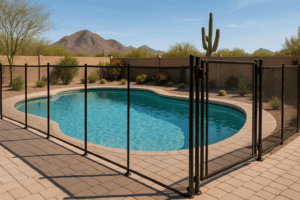Understanding pool fence regulations can be complex, but it’s imperative for ensuring the safety of your loved ones and staying compliant with local laws. As Pool Safety Fencing, your go-to experts in maricopa County, AZ, we’re here to guide you through the maze of regulations with an informative and easy-to-read guide. This comprehensive piece is designed to enlighten homeowners, especially those residing in gilbert, chandler, mesa, Scottsdale, and Tempe, about the critical aspects of pool fencing. Let’s dive into the specifics, making pool safety both understandable and actionable for you.
Contents
- 1 why pool safety Fencing Is Essential
- 2 Understanding Your Local Pool Fence Regulations
- 3 The Importance of Regular Pool Fence Inspections
- 4 Choosing the Right Material for Your Pool Fence
- 5 DIY vs. Professional Pool Fence Installation
- 6 Integrating Pool Safety Features Beyond Fencing
- 7 Understanding the Financial Implications of Pool Fencing
- 8 Getting Your Pool Fence Up to Code
- 9 Key Considerations for Pool Fence Maintenance
- 10 Conclusion
why pool safety Fencing Is Essential
The importance of pool safety fencing cannot be overstated. First and foremost, it serves as a critical barrier preventing unintended access, particularly by children, to the pool area. Accidental drownings are tragically common, and a sturdy, compliant fence drastically reduces this risk. Furthermore, beyond the immediate safety benefits, installing a pool fence is also a legal requirement in many localities, including ours. Staying informed and compliant not only ensures safety but also helps avoid potential fines or legal issues.
In addition to safeguarding your loved ones, pool fencing also plays a significant role in protecting pets and wildlife from accidental drowning. With various design options available, it can enhance your backyard’s aesthetics, contributing positively to your property’s overall value. Understanding the regulations and ensuring your fencing meets the required standards is where we come in, making the process as smooth and stress-free as possible.
Understanding Your Local Pool Fence Regulations
Navigating the specifics of local pool fence regulations can seem daunting at first. Regulations can vary significantly by locality, with specific requirements regarding the height, material, and features of pool fences. In general, most areas require fences to be at least 4 feet high with self-closing, self-latching gates to ensure they remain secured.
It’s crucial to consult with local authorities and pool safety experts to understand the exact requirements in your area. As professionals operating within Maricopa County, AZ, we are intimately familiar with the regulations governing Gilbert, Chandler, Mesa, Scottsdale, and Tempe. Trust us to provide you with the most current and comprehensive information, ensuring your pool area is both safe and compliant.
The Importance of Regular Pool Fence Inspections
Installing a pool fence is just the beginning; regular inspections are key to maintaining its integrity and effectiveness. Weather conditions, wear and tear, and other factors can affect your fence’s condition over time. Regular inspections help identify potential issues before they become safety hazards.
We recommend a thorough inspection at least once a year or after any major weather event. Look for signs of damage, loose components, or anything else that could compromise the fence’s security. For those unsure of what to look for, our team offers professional inspection services, ensuring your pool fence remains in top condition year-round.
Choosing the Right Material for Your Pool Fence
Deciding on the right material for your pool fence is a balance between aesthetics, functionality, and compliance. The most common materials used are aluminum, steel, glass, and mesh, each offering its own set of advantages and considerations in terms of visibility, durability, and maintenance needs.
Aluminum and steel are popular for their durability and minimal maintenance, while glass offers a modern look and unhindered views of your pool area. Mesh fences are lightweight and removable, providing flexibility for families. We guide our clients in selecting the best material to meet their safety requirements, budget, and stylistic preferences, ensuring a result that’s both beautiful and compliant.
DIY vs. Professional Pool Fence Installation
While a DIY pool fence installation might seem like a cost-effective option, the risks often outweigh the savings. Without the proper tools, experience, and knowledge of local regulations, it’s easy to end up with a fence that’s neither safe nor compliant, potentially leading to fines or, worse, injury.
Professional installation, on the other hand, guarantees that your fence meets all safety standards and regulations, ensuring peace of mind. Our team of experts at Pool Safety Fencing not only installs your fence but also offers valuable advice on maintaining its safety features over time. Trusting professionals with your pool fence installation saves both time and potential headaches down the line.
Integrating Pool Safety Features Beyond Fencing
While pool fencing is a critical component of pool safety, it’s not the only measure worth considering. Integrating additional safety features can provide an extra layer of protection for your family and peace of mind for you.
Consider adding alarms to gates and doors leading to the pool area, covers that can support weight, and even pool immersion alarms that trigger when unexpected entry into the water is detected. Each of these features complements your pool fencing, creating a comprehensive safety net around your pool area.
Understanding the Financial Implications of Pool Fencing
Investing in pool safety, including fencing, is investing in your family’s well-being. While there are upfront costs associated with installing and maintaining a pool fence, the value it adds in terms of safety and compliance cannot be overstated. Moreover, a well-designed and installed pool fence can enhance the aesthetic appeal and overall value of your property.
It’s also worth considering the potential costs of non-compliance, including fines and increased insurance premiums. By investing in a compliant pool fence, you’re not only safeguarding your loved ones but also protecting yourself financially.
Getting Your Pool Fence Up to Code
Ensuring your pool fence meets local regulations is critical for both safety and legal compliance. This involves understanding the specific requirements related to fence height, material, gate specifications, and more.
If you’re unsure whether your current fence is up to code, our team is here to help. We offer comprehensive assessments, identifying any areas of concern and providing solutions to get your fence compliant. With our expertise, getting your pool fence up to code is a straightforward and hassle-free process.
Key Considerations for Pool Fence Maintenance
- Regular Cleaning: Keeping your pool fence clean not only maintains its appearance but also allows for clear visibility and inspection of potential wear and tear.
- Immediate Repairs: Addressing any damage or issues immediately helps prevent potential safety hazards and ensures your fence remains compliant.
- Professional Inspections: Scheduling regular professional inspections can identify problems you might overlook, guaranteeing your fence’s integrity.
- Gate Functionality: Regularly check your gate’s self-closing and self-latching mechanisms to ensure they function correctly, as these are pivotal for safety.
- Weather Considerations: Be mindful of your local weather conditions and their impact on your fence, especially if you live in an area prone to extreme weather.
Conclusion
Ensuring your pool’s safety through compliant fencing need not be an overwhelming task. With the right guidance and professional support, your pool area can be both a safe and enjoyable space for everyone. If you’re in Maricopa County, AZ, and in need of pool fence services, don’t hesitate to reach out to us by phone at 480-771-8026 or request a free quote. Our team is ready to assist you with all your pool safety needs.




